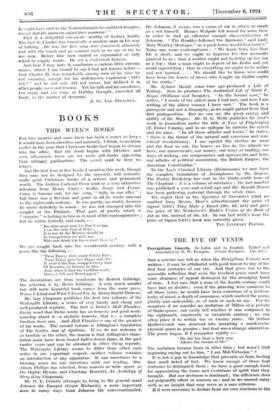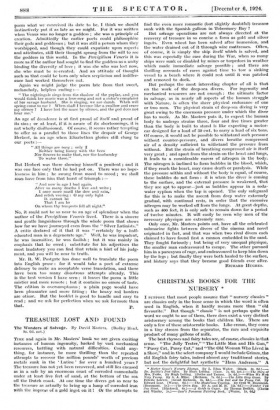. THE EVE OF VENUS
Pert/100am Veneris. Latin and in English. Edited and
translated by R. W. Postgate. (Grant. Richards. 15s. net.)
NOT a -scholar can tell-us when the Pervig,ilium Veneris was written : it may be attributed with godd reason to any of the first four centuries •of our era. And that gives rise to the miserable reflection that even the loveliest poem must have some clearness - of - appeal- destroyed -by. the smudging • hand of.time. • I feel sure that a man of the fourth century could have had no doubts ; even if the phrasing were common to all those years, he would have been conscious of a, particu- larity of mood, a depth of awareness, which marked the poem, plainly and undeniably, as of such or such an age. For we ourselves if we consider on imitation of Milton or a parody of Shakespeare, can easily tell whether it was composed in the eighteenth, -nineteenth or twentieth century ; we can often place it to within ten or twenty years. Sir Arthur Quiller-Couch was -deceived _into. accepting a mock-meta- physical poem-as genuine ; but that was a-strange -aberration. The poem began, if I remember rightly :— " He did but float a little way
Adovrn the stream of life."
The imitation became truer in other lines ; but wasn't that beginning crying out to him, " I am Mid-Victorian " ?
It is not a gap in knowledge that prevents us. from finding that small detail of fact. We know enough of those four centuries to -distinguish them ; we have a good enough basis for appreciating the turns and evolutions of spirit that they brought. But our alertness is deadened-; .the-difference does not-poignantly affect or concern us ; and so we -cannot -carry with us an insight that may serve as a .sure- criterion.
If it were necessary to declare from our own reactions to the poem what we conceived its date to be, I think we should instinctively put it as late as we might. For it was written when Venus was no longer a goddess ; she was a principle of creation.. Admittedly the earlier poets could philosophize their gods and goddesses ; but it was still a person whom they worshipped, and though they could expatiate upon aspects
and attributes, still their thought sprang from the will to see the goddess in this world. In the Pervigilium Veneris it is
more as if the author had sought to find the goddess as a unity binding the diversity of love ; it was she who was lost now, she who must be re-created. And an attitude of thought such as that could be born only when scepticism and indiffer- ence had worked themselves out.
Again we might judge the poem late from that sweet, melancholy, helpless ending :-
" The nightingale sings from the shadow of the poplar, and you would think her music was a love-song and not a sister's complaint of her savage husband. She is singing, we are dumb. When will spring come to me ? When shall I become like a swallow and cease my silence ? I have lost tho muse by silence, and the god does not hear me."
An age of decadence is at first proud of itself and proud of its sins ; or at least, if it is aware of its shortcomings, it is not wholly disillusioned. Of course, it seems rather tempting to offer as a parallel to those lines the despair of George Herbert, in an age when Elizabethan glories still clung to our poets :—
" All things are busy ; only I
Neither bring honey with the bees Nor flowers to make that, nor the husbandry To water these."
But Herbert was there showing himself a penitent ; and it was one face only that he had put on. There was no hope- lessness in him ; he swung from mood to mood ; we shall soon have from him that burst of triumph :-
" And now in age I bud again,
After so many deaths I live and write ; I once more smell the dew and rain, And relish versing 0 my only light
It cannot be
That I am he On whom thy tempests fell all night."
No, it could not be so near to an age of splendour when the
author of the Pervigiliuns Veneris lived. There is a sincere and gentle languidness through the whole poem that shows
how far we have journeyed even from the " Silver Latinists." A critic declared of it that it was " certainly by a half-. educated man in a degenerate age." Well, he was impudent, he was insensitive, he was foolish ; but it was mainly in emphasis that he erred ; substitute for his adjectives the most laudatory you can find that retain a hint of his judg- ment, and you will be near to truth.
Mr. R. W. Postgate has done well to translate the poem into English prose : for it would take a poet of extreme delicacy to make an acceptable verse- translation, and there have. been too many disastrous attempts already. This
is the best version I have seen ; it leaves the poem a little
mistier and more remote ; but it contains no errors of taste. The edition is oversumptuous ; a plain page would have been pleasanter and more fitting ; the heavy red borders are otiose. But the booklet is good to handle and easy to read ; and we -ask for perfection when we ask for more than



















































 Previous page
Previous page